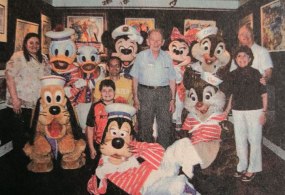
Kurt Steiner, standing in center, celebrated his 100th birthday in 2012 aboard a Disney cruise ship along with four generations of his family and several Disney cartoon characters.
CRANFORD, N.J. — Since Kurt Steiner moved to Cranford in 1953 he has led a quiet life, especially compared with his younger years, when he fled the Nazis in Austria before World War II.
“We went through Switzerland by train. This way, we got out of the Nazi border,” the 107-year-old Steiner said in a Nov. 8 interview with LocalSource. “In the evening, we went to the French border, and the Nazi guard went along with us. We crossed the channel into England. The next day, we went to Liverpool.”
Steiner’s story was one of the more dramatic among the seven centenarians from Scotch Plains, Mountainside, Maplewood and Short Hills who were honored by Summit Medical Group on Oct. 29 at collective birthday party held to celebrate the health system’s 100th anniversary.
One month after his 27th birthday, Steiner and Nora, his wife of four months, fled Vienna and the German annexation of Austria.
“My name is Kurt Steiner, I’m a Holocaust survivor,” Steiner said in a short video that was part of the event. “I was born in Vienna, Austria, on April the 25th, 1912. My wife had relatives in the United States, and we wrote to them that we were unable to make a living anymore. We would need somebody to help us to get a permit to come to the United States.”
Life in Vienna became difficult for Jews after the 1938 Anschluss, when Germany took control of neighboring Austria. Steiner and his wife lost their jobs and received small unemployment checks. They had to sell their furniture and wedding gifts.
“We lost our jobs when the Nazis came. We were relocated,” he said.
“People started to become desperate and wrote to friends and family in other countries,” Steiner said. “Nobody wanted to help us. There were shortages of food. There was a time when a pair of shoes was a birthday gift.”
The couple moved through Switzerland from Vienna, where Steiner was strip-searched at the Swiss border by a Nazi guard looking for jewelry. He found nothing and let Steiner go.
“They had a soup kitchen for the Jewish families. We ate soup and vegetables because the meat was not kosher.”
Steiner and his wife traveled through Switzerland, to France, to Liverpool, England, where they met his sister, Gertrude, who had also escaped Austria. She remained in England until her death at 102, and her children and grandchildren are still there. Nora Steiner’s family in the United States helped the couple obtain letters of sponsorship. They also wrote to the chief rabbi in Newark, who promised sponsorship, as did the Jewish Council of Women. And so, for Steiner and his wife, it was on to Boston and finally Newark on May 22, 1939.
When they arrived, the United States was still in the midst of the Depression. In Newark, they moved into a small room with a kitchenette and later rented a larger apartment. Steiner got a job in a box factory and his wife worked as a bookkeeper and in sales. After living in Newark, they moved to Clifton and then to Cranford. The couple had a son, Joseph, and two grandchildren, Bryan and Karen. Their great-grandson, Donavan, now studies engineering at the University of South Carolina.
Steiner later became a driver for a diaper service and and an apprentice toolmaker, which started at 96 cents an hour; he worked there for 34 years.
“When I was 65 years old, I had enough and I retired,” he said. “I had a small pension from the company. What I wasn’t sure of was if we would get reparations from Europe. We got a small pension from Europe, which was enough to be able to keep the house.”
Nora Steiner died in 1999 due to a stroke she had suffered four years earlier. The couple’s granddaughter, Karen, died at age 43 from a heart attack.
“She would bring me supper here. I miss her very much,” he said of his granddaughter.
Today, Steiner still does his own cooking, and receives help three times a week. On Fridays, his son, Joe, takes him grocery shopping.
“I eat salad every day. I make myself salad for three or four days. I don’t eat very much meat. I’m eating apples, grapes, pears, whatever is in season.”
Steiner’s hobbies used to include photography and his garden, where he grew corn, tomatoes and peppers. And he has been a member of the synagogue in Cranford since his arrival in the township 76 years ago.
“I am surprised I still open my eyes every morning,” he said.
